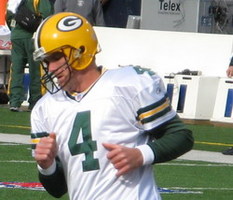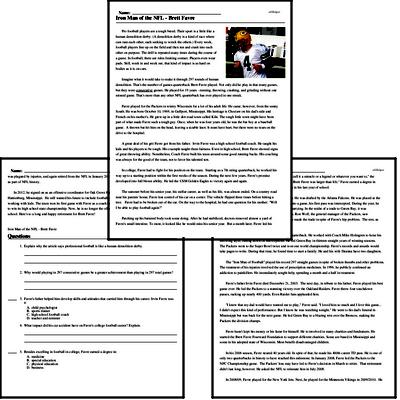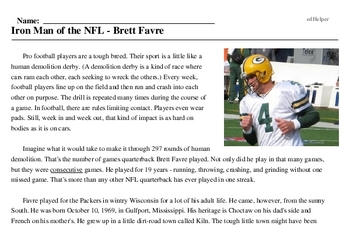Iron Man of the NFL - Brett Favre
Pro football players are a tough breed. Their sport is a little like a human demolition derby. (A demolition derby is a kind of race where cars ram each other, each seeking to wreck the others.) Every week, football players line up on the field and then run and crash into each other on purpose. The drill is repeated many times during the course of a game. In football, there are rules limiting contact. Players even wear pads. Still, week in and week out, that kind of impact is as hard on bodies as it is on cars.
Imagine what it would take to make it through 297 rounds of human demolition. That's the number of games quarterback Brett Favre played. Not only did he play in that many games, but they were consecutive games. He played for 19 years - running, throwing, crashing, and grinding without one missed game. That's more than any other NFL quarterback has ever played in one streak.
Favre played for the Packers in wintry Wisconsin for a lot of his adult life. He came, however, from the sunny South. He was born October 10, 1969, in Gulfport, Mississippi. His heritage is Choctaw on his dad's side and French on his mother's. He grew up in a little dirt-road town called Kiln. The tough little town might have been part of what made Favre such a tough guy. Once, when he was four years old, he was the bat boy at a baseball game. A thrown bat hit him on the head, leaving a sizable knot. It must have hurt, but there were no tears on the drive to the hospital.
A great deal of his grit Favre got from his father. Irvin Favre was a high school football coach. He taught his kids and his players to be tough. His example taught them fairness. Even in high school, Brett Favre showed signs of great throwing ability. Nonetheless, Coach Favre built his team around some good running backs. His coaching was always for the good of the team, not to favor his talented son.
In college, Favre had to fight for his position on the team. Starting as a 7th string quarterback, he worked his way up to a starting position within the first weeks of the season. During the next few years, Favre's promise developed into full blown ability. He led the USM Golden Eagles to victory again and again.
The summer before his senior year, his stellar career, as well as his life, was almost ended. On a country road near his parents' home, Favre lost control of his car on a corner. The vehicle flipped three times before hitting a tree. Favre had to be broken out of the car. On the way to the hospital, he had one question for his mother: "Will I be able to play football again?"
Patching up his battered body took some doing. After he had stabilized, doctors removed almost a yard of Favre's small intestine. To most, it looked like he would miss his senior year. But a month later, Favre led his team to a spectacular win over Alabama. "You can call it a miracle or a legend or whatever you want to," the Alabama coach said. "I just know that, on that day, Brett Favre was larger than life." Favre earned a degree in special education as well as the admiration of many in his last year of school.
Favre's first year as a pro wasn't a huge success. He was drafted by the Atlanta Falcons. He was placed at the third string quarterback spot. When he finally got into a game, his first pass was intercepted. During the year, he clashed with his head coach and got in trouble for partying. In the midst of a trade to Green Bay, it was discovered that Favre had a bone disease in his hips. Ron Wolf, the general manager of the Packers, saw something in Favre that he wanted for his team. He made the trade in spite of Favre's hip problem. The rest, as they say, is history.




